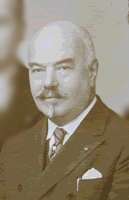Nikolay Kedrov Sr.
Nikolay Nikolayevich Kedrov Sr. (Russian: Николай Николаевич Кедров; 28 October 1871 – 2 February 1940) was a Russian composer of liturgical music. His setting of Otche Nash (The Lord's Prayer) is one of the best-known in the repertoire.

Family
Kedrov was born in Saint Petersburg, Russian Empire, into the family of a Russian Orthodox archpriest.[1][2] His wife was Sofia Gladkaya (Kedrova; ru: Софья Николаевна Гладкая; 1875–1965), a singer at the Mariinsky Theatre. His daughter was actress Lila Kedrova, and his son was Nikolay Kedrov Jr.
Career
From 1894 to 1897 he studied singing at the St. Petersburg Conservatory, becoming an operatic baritone[3] who performed at various theaters, including the Bolshoi and the Mariinsky Theatre.
In 1897 he organized a men's vocal quartet (Saint Petersburg Russian vocal quartet). [4][5] Their first concert was held in 1898 at the St. Petersburg Conservatory. The repertoire of the quartet included Russian folk songs, ballads, opera music, then gradually liturgical music appeared. The quartet each year successfully toured Europe, including participation in Diaghilev's seasons. In 1913/1914 Feodor Chaliapin and the quartet recorded a musical album in London. In 1917, Kedrov became a professor of the St. Petersburg Conservatory.
Some time after the October Revolution, in 1922, the family emigrated from Russia and lived in Berlin, in 1928 moved to France. In Paris, Kedrov recreated the quartet (Quatuor Kedroff). The repertoire of the ensemble in exile included liturgical chants of the Russian Orthodox Church.[4] The quartet toured in Europe and North America.
Kedrov taught at the Conservatoire Rachmaninoff in Paris.
The most famous of his work as a composer is singing Our Father (ru: Отче наш), written in 1922. [6]
Death
Nikolay Kedrov died on 2 February 1940 in Paris, aged 68. He was interred in the cemetery of Sainte-Geneviève-des-Bois Russian Cemetery. After his death, the ensemble was headed by his son, Nikolay Kedrov Jr.
References
External links
- Free scores by Nikolai Kedrov at the International Music Score Library Project (IMSLP)
- Free scores by Nikolay Kedrov Sr. in the Choral Public Domain Library (ChoralWiki)